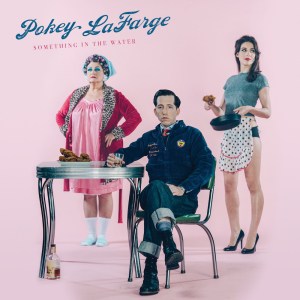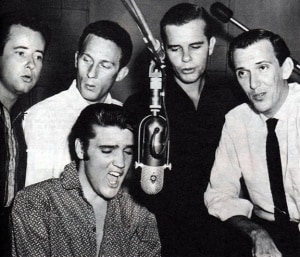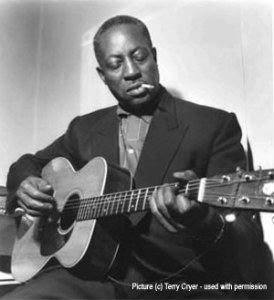Pokey LaFarge: Travellin’ Man (Interview)
Pokey LaFarge is no stranger to the road. Its not uncommon for the Illinois native to play over 200 shows a year. In fact, he was in New Zealand less than a year ago. But with a new album ready for release titled Something In The Water, Pokey is about to bring his unique mix of old-timey blues, doo-wop and folk music to New Zealand again, with a tour that begins on March 26th at Auckland’s Tuning Fork. The 13th Floor’s Marty Duda spoke to Pokey LaFarge about his soon-to-be released album and how he achieves his distinctive sound.
Listen to the interview with Pokey LaFarge here:
Or, read a transcription of the interview here:
MD: I’ve just heard a version of your new album, Something In The Water. So that’s going to come out in April. I remember you did a few songs from the show when you played up here, All Night Long and Goodbye Barcelona and stuff, so has the album kind of been a long time in working or how did it come about?
PL: Yeah both those songs are pretty different in their arrangements with what I was doing live.
MD: Oh I see.
PL: But it has been a long time coming. I have worked on it pretty much a week a month last year up in Chicago.
MD: Right, yeah. I see you mentioned Chi-Town in All Night Long.
PL: Chi-Town, yeah, good job Marty
 MD: So for folks who are familiar with you from the previous album that you put out on Third Man, this one’s on Rounder? Am I correct?
MD: So for folks who are familiar with you from the previous album that you put out on Third Man, this one’s on Rounder? Am I correct?
PL: Correct-a-mundo!
MD: Yeah. So is there a difference in what people hear just because of the change in Label or does that kind of not make any difference these days?
PL: Well I’d be interested in what your interpretation of that would be.
MD: Okay.
PL: But I will certainly say that there is, but not necessarily because it’s a different label obviously.
MD: Right.
PL: I think, well I know, that the biggest difference would be the fact that there’s drums on every song except for one.
MD: Right.
PL: There’s also like 3 part, 3 or 4 part harmony on almost every song.
MD: You’re fading away from me, I don’t know if you’re on a speaker phone.
PL: Yeah, sorry about that. Besides the drums there’s like 3 or 4 part harmonies on pretty much every tune.
MD: Right.
PL: That’s a big addition, two additions which you’ll see, I’ll showcase live.
MD: Oh okay.
PL: I’m very excited about bringing that to New Zealand.
MD: Cool.
PL: There’s a lot more electric guitar, a lot of piano and a lot more banjos, 6-string banjo, and tenor banjo, all which will be showcased live except for the piano.
MD: Right.
PL: Yeah. So in terms of instrumentation alone, there’s some big differences. But I would say in terms of sonic quality and musical influence, lyrical influence, lyrical quality, I think that they’ve all improved.
MD: Right.
PL: Diversified in a lot of ways. My vocal style and the way that we’re able to capture everything and record it, I think we really got some cool, sexy grooves all in this record man.
MD: Yeah, absolutely. Quite a bit of trumpet or cornet playing on it as well.
PL: Yeah which there was on my last 2 albums but I don’t believe it was quite as much. On the last 2 records there was like 2 horns on each song, or like 2 horns at a time on a song. Where on this record there’s 3 horns, sometimes 5 or 6 in terms of Barcelona, so.
Listen to Goodbye Barcelona from Something In The Water, here:
MD: Right.
PL: Yeah man. I mean it’s, there’s a lot more addition instrumentally but I also think that which that being said me and Jimmy were, it was a focus of ours and we nailed it I think, of maintaining enough space for everything to breathe.
MD: Right.
PL: Vocals included.
MD: Obviously you kind of are aiming for this old timey sound or vibe to it but you don’t want to kind of be aping something that was created 60, 70 years ago. How do you kind of find that balance? Is it something that you really have to work on in the studio?
PL: No not so, I mean, you’re really are going for a good is a good song, you’re going for the best song. So I guess from a producer’s stand point and ultimately my stand point which I have to think of myself as a producer somewhat as a songwriter, you’re just trying to get the best song. Sometimes things just come out of you if it makes you feel good and if it’s a good song, you just go with it.
MD: Right.
PL: I don’t just sit down with a guitar and pen and actually write an old timely song, it doesn’t really work that way. It’s really just what makes you feel good, what’s got a good groove, what is a platform for saying things that you want to say. It’s just a feeling, you’re just kind of following a feeling. When you have people that, however, understand music in general, I mean I think it’s great to collaborate with people that have different backgrounds than you do, but in this case I was dealing with people that have a similar background to me but also just as diverse but diverse in different ways. Even more specifically to the recording process, people that really understand what just like a quality song is, understand what a quality recording is. It’s not necessarily about sounds old timey or recording things that are old timey or dressing old timey or sounding old timey, it’s not like that. It’s just going for the things that are of the utmost quality that are accessible to you. I think quality is, well quality will always be relevant, quality itself is timeless. You look at barbering, you look at shoemakers, you look at denim makers, all these things are coming back just as well as you might say old time music and I would say people want things that are changeable, and that are quality and simple and understandable. I think that itself can be the platform for making a very powerful changes in this world.
MD: So was it important to find the right room to record in? Is the sound of the…
PL: Of course.
MD: Yeah.
PL: But that room is already there, Hi-Style Studios. The room, the gear, its all recorded to tape, the microphones, I mean those things will get a sound that digital technology can not necessarily replicate. It’s a feeling as well but the feeling you can get from being in a room with that gear and with the right people. I mean it’s the feeling that’s number one, I think a room is important to creating just as much as it is creating the sonic value.
MD: Right. It’s kind of interesting because you’re not, I mean you’re a relatively young man, I believe you’re in what, your early 30s somewhere along the line.
PL: 31.
MD: 31.
PL: 31 and a half.
MD: There you go. For a lot of folks of your generation, those kind of aesthetics aren’t really, they aren’t aware of them because they grew up listening to things on the internet and listening to MP3s and things like that. How did you develop that kind of sensibility?
PL: Well I mean I would argue that I grew up listening to things on the internet and I grew up listening to things on MP3 as well. New music as well as old music is all documented on the internet and I would actually encourage people to go to the internet as a source of listening to old music as much as I would say going to a record shop and buying a record. So I do that now but since the internet wasn’t so much a thing when I was young, I think I was probably the last generation that really didn’t have the internet as a focal point in our lives. It was listening to things on the radio, listening to friend’s CDs, friends parent’s CDs and just being interested, just being intrigued and having an open mind as a young artist. I was writing a lot and just felt this power in me and wanted to express myself and wanted to be influenced by things outside of my own upbringing in a small town in Illinois. So I would go to the library and pull records and pull CDs, tapes and record them all and everything like that on the tapes and CDs so that I could carry them around with me. As I got older, once you got more advanced I think that stuff just made it more accessible.
MD: Right.
PL: And as I travelled around, I met more people that were sort of interested in some of the things I was listening to. So that certainly helped.
MD: How much did your location come into that? You being in Illinois at the time in the mid-west. Is that an integral part of kind of who you are musically?
PL: I think no matter who you are or where you’re from has a lot to do with it, yeah. So I think embracing that was an important part of my growth and my then evolved identity. I think that however that wouldn’t have happened if would not have left home at 17 and got out and seen a large part of the world.
MD: And when you did that, where did you go and how did you travel around?
PL: Well I first left home at 17. I graduated high school and I was young for my class, so that’s why I graduated at 17. I went west, I went to Oregon, I was hitchhiking around for about a year and a half. Ended up making it to Wisconsin, started a band there, but since then, touring. I’ve been to 49 states repeatedly. I’ve been to 6 Canadian Provinces, one territory. I’ve been to 4 continents, 20 countries and hopefully more soon. I’m really excited to go back to Australia and New Zealand, but either way I’d like to maybe start dipping into some parts of Asia, Japan would be great. I’m really dying to see Eastern Europe.
MD: Right.
PL: That’s kind of the next thing I really want to see.
MD: And which state haven’t you been to? You said you’ve been to 49.
PL: Alaska.
MD: You haven’t made it to Alaska, well it shouldn’t be that tough to get in there.
PL: Alaska, yeah. That’s what I got to do.
MD: Do people react differently to your music depending on where you play it?
PL: Man, they totally do. That’s such an interesting question. I mean, I got to say the Aussies and the Kiwis are some of the best people to play in the world and I’m not just playing to you for favourites or nothing. I think if you asked a lot of American musicians or I guess any musician that toured there from outside there, maybe Aussies and Kiwis would say the same thing about themselves. But just wonderful audiences, the perfect kind of audiences where they’re really attentive, but they know how to party and they know how to show their appreciation. So yeah, other places however don’t, other places maybe appreciate you every bit as much as a rowdy Kiwi or a rowdy Aussie but they just don’t show it on the outside. So that’s a big stark contrast right there.
MD: And I assume that the audience energy effects the live performance in some way or fashion.
PL: It does, it definitely does. But you can’t…it of course will, but you can’t let it affect you in a negative way.
MD: Right. So now getting back to…
PL: People enjoy themselves in their own way.
MD: Yeah. Getting back to Something In The Water, the album. I’m just wondering if there are, to me I hear all sorts of things in it, obviously there’s Blues and Dixieland, kind of black vocal groups from the 40s and all that. Is that all stuff that you’re listening to and trying to kind of put together in a different way?

PL: Well I grew up listening to a lot bluegrass music. So 3 to 4 part harmonies is a huge thing for me, I guess, which has been a huge thing for me for years and years. Of course listening to Doo-Wop and Soul and a lot of Country Music that I listen to. There’s one backing group that is, of course I love the Mills Brothers and at the same time Bing Crosby and all those kind of early before Doo-Wop kind of groups. I really love The Jordanaires who are the vocal group that backed up Elvis, backed up a lot of country groups in the 50s and 60s. That was kind of a big influence in terms of the backing vocals.
MD: Yeah. Like on the track, When Did You Leave Heaven. It kind of reminded me of, are you familiar with The Ravens?
Listen to When Did You Leave Heaven, from Something In The Water, here:
PL: Oh yeah.
MD: And the kind of ‘Ooo’ those smooth ‘Oooos’ and stuff.
PL: Exactly, especially when they open up at the end with the ahhhs… very much. You know, that music has a special place in my heart, it’s a tune that I really like to sing. It’s an old tune but it’s a song by a Blues musician named Big Bill Broonzy who has a special place in my heart, a special place in Chicago history.
MD: Right.
PL: All Night Long is a Tampa Red song and he’s another early Chicago Blues musician. So it’s kind of fitting that those are the only two covers on the album were ones by early Chicago pioneers, seeing as how the album is recorded by mainly Chicagoans in Chicago.

MD: Well speaking of Big Bill Broonzy, I believe Dave and Phil Alvin, who have done an album kind of a tribute to Big Bill, are coming to play in the same venue that you are, fairly close to where you are. Have you heard their album?
PL: Absolutely. The producer Jimmy said on my record one of his favourite bands of all time is The Blasters.
MD: There you go. Excellent. I remember seeing The Blasters and they had Lee Allen with them, the Sax player from Little Richard. It was pretty awesome back in the early 80s.
PL: The man’s legendary man.
MD: Yeah. Well I appreciate you taking time to talk to me. I saw you last time you were here. The album, I assume, will be out relatively close to the time you’re back again. So I imagine there will be a few tunes from it when you get here, right?
PL: Yeah. Well the record’s going to be released April 7th worldwide, but I believe that the Kiwis and then the Aussies are going to be the first people to have it released. It’s going to be released in advance I think, like the 24th or something, might want to check that. I know it’s definitely a couple weeks before the rest of the world.
Click here for more details about Pokey LaFarge’s 2015 New Zealand tour.
- Civil War – Dir: Alex Garland (Film Review) - April 9, 2024
- Pearl Jam – Dark Matter (Monkeywrench/Republic) Album Review - April 1, 2024
- Blonde Redhead – New Zealand Tour 2024 - March 14, 2024
